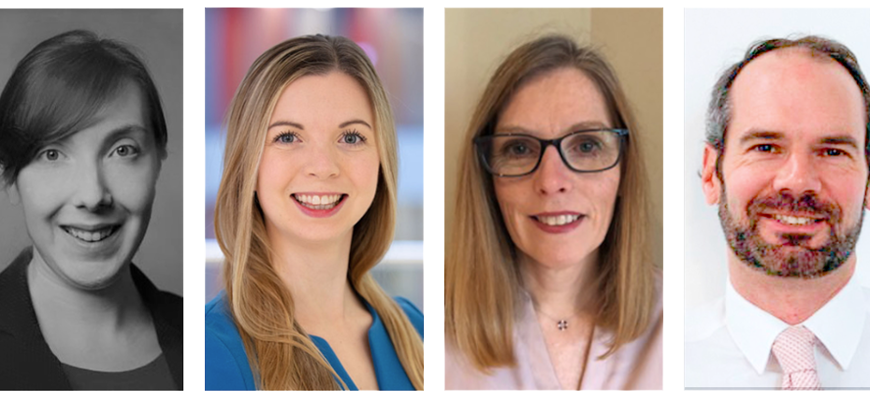Four to the fore: ILC’s new faces

Brief introductions – tell us about your career path to date; how have you got to where you are now?
Hope Craig: I trained in private practice and I moved in-house not long after I qualified. I have been working at Heriot-Watt University since 2017.
Lynette Purves: After enjoying a varied traineeship with a full service commercial law firm, I worked as a commercial property lawyer in private practice for six happy years until it was time for a new challenge. Having experienced and thoroughly enjoyed in-house life through a couple of past secondments, my sights were set on moving in-house. As a renewable energy and climate enthusiast at heart, I was delighted to land my current role as UK legal counsel for European renewable energy company, ERG.
Anne Garness: I trained and initially worked in private practice. In 2001, I decided to make the move to the public sector, and spent 18 years at Angus Council where I was DPO and managed the property, contracts and information governance team. A year ago I felt it was time for a change and took a position in the Legal & Corporate Governance team at the Scottish Social Services Council, where I provide advice on information governance, contracts and the legislative framework underpinning the work of the SSSC.
Neil Campbell: I would describe my career path as long and winding but incredibly rewarding! I am currently a managing legal counsel in the Outsourcing, Technology & IP team at NatWest. Prior to NatWest, I spent six years in Sydney, working at one of Australia’s largest law firms before moving to an in-house role with an Australian energy company. I studied law at Dundee University and my traineeship was with a sole partner firm. When I first qualified, I wasn’t sure what I wanted to do. I joined a small in-house team in a software company, and it opened my eyes to the role of the in-house lawyer.
You all work for very different organisations, doing very different roles. What are some of the common themes that bring such a diverse group together?
NC: I think there are lots of common themes which unite us. For example, becoming truly customer focused and the need to develop the skills and behaviours which are necessary to become a successful in-house lawyer. The challenges and opportunities facing the legal profession apply as much to in-house as to private practice. For example, new legal service providers entering the market; the potential for technology to disrupt the traditional role of the lawyer; concerns about wellbeing, diversity and inclusion; and the increasing pressure from clients to do “more for less”.
HC: Despite in-house lawyers working in a wide variety of sectors, our roles all involve promoting the needs and strategies of the organisations in which we work, whilst also adhering to the professional standards and ethical obligations that lawyers must abide by. An in-house legal team is just one piece of an organisation’s jigsaw; an in-house lawyer must be able to work collaboratively with colleagues from various departments to deliver results. We use our legal knowledge to enhance the organisation and so we must evolve in our roles to meet any changing business needs.
AG: I believe that the role of an in-house lawyer is to have a “can do” approach which provides the support needed to deliver the service within the governance arrangements of the organisation. The skillset for an in-house lawyer is the same, regardless of the employer – an understanding of the needs of the organisation, an ability to find solutions as well as provide legal advice, and lots of tenacity to see things through. I’m pleased that in recent years we’ve seen a rise in the profile of in-house lawyers and they are getting the recognition they rightly deserve in the role they play. The ILC has played an important part in this.
Why did you join the In-house Lawyers’ Committee? What do you hope to bring to the role of committee member and what do you hope to get out of it?
LP: “Alone we can do so little; together we can do so much,” as Helen Keller so rightly put it. As Scotland’s community of in-house lawyers continues to grow, I believe that our ILC has an important role to play in creating and facilitating opportunities for connecting and collaborating with each other. I am therefore particularly excited to be working on launching our new online networking platform for sole in-house counsel and small teams, as well as working on creating new networking, mentoring and personal development opportunities across our whole in-house community.
HC: The ILC is doing a lot of fantastic work, including the creation of the online community platform this coming year. I am keen to raise awareness of the value that in-house lawyers bring not only to the organisations in which they work, but also to the wider legal community. I also want to use this opportunity to highlight the interesting and varied work of the various legal teams within the Scottish higher and further education sector.
AG: I wanted something positive to remember about 2020! I noticed that the ILC did not have anyone representing a regulator and thought I could bring this different perspective to the committee. Regulators play such an important part in protecting the public and I thought it would be good to bring this perspective to the Law Society of Scotland, a fellow regulator of course. The SSSC was very supportive of my application, recognising that this professional development activity would benefit it as well as myself. I’m looking forward to working with fellow committee members from different sectors to discuss issues affecting the in-house sector, promote engagement with the in-house lawyers’ community and hopefully learn some new skills along the way.
NC: I believe it is important to give something back to the wider community. I have a lot of experience as a lawyer, but more than that I am enthusiastic, proactive and enjoy collaborating with others! I am a member of the O Shaped Lawyer working group, a group of UK in-house lawyers who are working with universities, law firms and in-house teams to encourage the learning and development of more human centric skills (like empathy, collaboration, openness, trust, communication) by law students and practising lawyers alike: see Journal, September 2020, 36. One thing I would like to do is raise awareness of the O Shaped Lawyer Programme within the wider in-house community in Scotland.
2020 has been quite a year! What do you see as the biggest challenges ahead for in-house lawyers (or in your sector) in 2021 and after the pandemic?
HC: The UK’s exit from the European Union and the COVID pandemic have both brought with them dramatic changes and unique challenges. This has resulted in in-house lawyers being asked to provide advice on a large volume of unprecedented issues, and 2021 looks set to be no quieter! Getting to grips with new legislation/Government guidelines is only part of the story. It is more important than ever that in-house lawyers are flexible and continue to develop their skills to provide their organisations with the support that they need.
AG: In my view, in-house lawyers have been facing some of the same challenges as those in private practice – trying to maintain the right work-life balance especially when working from home. In the public sector there is the continual pressure of diminishing resources and increased demand. That is only going to become more challenging when the impact of the cost of the pandemic resource is felt.
I fear the impact of the pandemic will continue well beyond 2021 for both employers and our members. It is good to see the efforts of the Society to support its members with the challenges, and in particular those struggling with mental health issues. Looking ahead, I’ve no doubt that despite the challenges from COVID, Brexit and the economic outlook, in-house lawyers will continue to strive to provide an excellent service, meeting the needs of their employer and its staff.
What advice would you give anyone looking to start a career in your sector or in-house more generally?
LP: If you’re thinking about moving in-house, why not reach out for an informal chat with those who have “been there, done that”? Hear their stories and ask them your burning questions. If you don’t know who to speak to, please feel free to drop me a line (or any other members of the ILC) – we’d be more than happy to help you.
Secondments in-house are also a great opportunity to “try before you buy”. Even if you decide to stay in private practice, you’ll no doubt return with increased commercial astuteness and that certain je ne sais quoi that can only be gained from working in-house.
And if you’re interested in working in the renewable energy sector? I’d say that there has never been a better time. With the UK hosting the upcoming COP26, and with an increasing number of renewable energy businesses basing themselves here in Scotland, it really is an exciting time to be working in this growing and innovative sector.
HC: In-house lawyer roles come in all sorts of shapes and sizes. Think about what you want to get out of your job and take it from there. Do not apply for a post simply because the vacancy has come up – do your research and assess it against what you are looking for in a job. If you are not sure whether working in-house is for you and you would like to find out more, keep an eye on the in-house lawyers’ blog on the Society’s website.
AG: I would encourage anyone to consider a career in-house. Whilst the financial rewards may not be the same as private practice, there are other worthwhile benefits. When working in-house you are part of a team, working with colleagues from different parts of the organisation, supporting them and contributing to projects from their initiation to completion.
NC: Go for it! This is an exciting time to be an in-house lawyer. If you have any questions or concerns, reach out to me or any member of the ILC.
Regulars
Perspectives
Features
Briefings
- Civil court: Who has the final word?
- Licensing: More change to come in 2021
- Planning: new route to vary an agreement
- Insolvency: Securing creditor confidence in pre-packs
- Tax: OTS on CGT – the right fixes?
- Immigration: False economy
- Scottish Solicitors' Discipline Tribunal
- Property: Scotland’s cities: is the landscape changing?
- Four to the fore: ILC’s new faces






